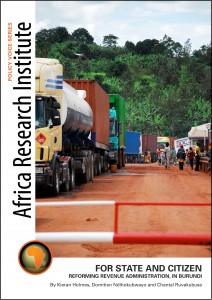 Africa Research Institute (ARI) announces that it is hosting the Office Burundais des Recettes (OBR) at an expert symposium on “Tax in Africa”. The event on Tuesday 15 October in London marks the publication by ARI of “For state and citizen: Reforming tax administration, in Burundi”.
Africa Research Institute (ARI) announces that it is hosting the Office Burundais des Recettes (OBR) at an expert symposium on “Tax in Africa”. The event on Tuesday 15 October in London marks the publication by ARI of “For state and citizen: Reforming tax administration, in Burundi”.
The authors of the report – Kieran Holmes (Commissioner General, OBR), Domitien Ndihokubwayo (Deputy Commissioner General and Commissioner for Customs and Excise) and Chantal Ruvakubusa (Commissioner for Domestic Taxes and Non-Fiscal Revenues) – will highlight the achievements of the OBR over the past three years.
Diplomats, UK parliamentarians, academics, tax experts, journalists, and representatives from donor agencies and the private sector will participate in the discussion, focusing on the lessons to be gained from Burundi’s experience of reforming tax administration.
Edward Paice, Director of Africa Research Institute, said: “We are delighted to welcome the OBR team to London. The OBR’s progress is quite remarkable under the circumstances, with important implications for tax administration in other post-conflict countries in Africa. We look forward to a candid and constructive dialogue between experts.”
Media enquiries:
Edward Paice, Director, Africa Research Institute (44) 207 222 4006
Notes to editors:
Tax is high on the agenda in Africa. At an international level, advocacy groups and the G8 have called for greater efforts to counter tax evasion and avoidance by multinational companies. But in many countries in sub-Saharan Africa, a similar – and arguably even more pressing – campaign is being waged to improve the capacity of the state to collect domestic revenues.
In 2009, despite a signally inhibitive outlook, the Burundi government implemented a number of measures to improve financial management. These included the creation of a new semi-autonomous revenue authority – the Office Burundais des Recettes (OBR). In 2012, tax revenues were 75% higher than in 2009 – a 25% increase in real terms. The contribution of tax to GDP had risen from 13.8% in 2009 to 16.7%.
In this report, the OBR’s management describe in detail how tax collection and administration has been reformed in Burundi. Their account highlights the actions taken to reduce corruption, improve services, implement legislative reforms and widen the tax base. The authors are clear about the difficulties confronting the OBR. Among other things, tax exemptions remain too high and the costs of taxing much of the informal economy outweigh any financial benefit. The continued success of an efficient revenue authority is dependent on a favourable political, business and legislative backdrop.











